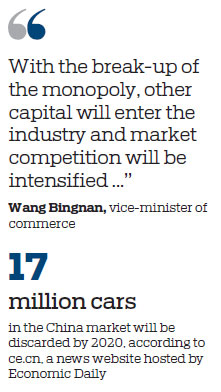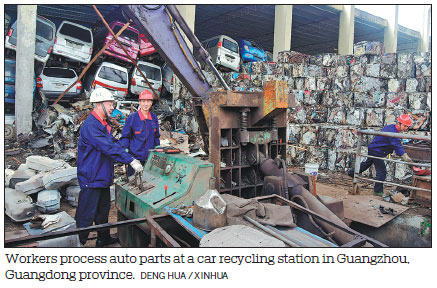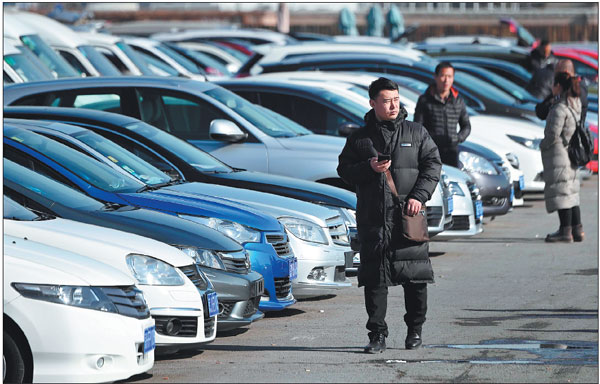New scrapping rules to benefit sector
Policy will push value of vehicle parts up, giving owners of old vehicles the chance to make more money
China is to introduce new policies on recycling scrapped motor vehicles, which is expected to stimulate the consumption of new and second-hand cars.
The new policy will legalize the selling of a scrapped vehicle's engine, gearbox, front and rear axle and frame to eligible automobile remanufacturing enterprises at market prices. This will significantly increase the value of scrapped cars and raise owners' motivation to scrap obsolete vehicles, Wang Bingnan, vice-minister of commerce, said at a policy briefing hosted by the State Council Information Office on Feb 22.
Currently, the five main parts of obsolete vehicles are only allowed to be sold as scrap metal to iron works. Their value is around 1,290 yuan ($192) per metric ton.
Cui Dongshu, secretary-general of the China Passenger Car Association, said as China's car ownership is seeing rapid growth and the upgrading of automobile products is accelerating, there is an urgent need for new rules in the scrap industry.
Data shows that China has around 240 million vehicles. Based on the international average scrap ratio of 4-6 percent, 14 million cars will become obsolete this year and 17 million units will be discarded by 2020, according to ce.cn, a news website hosted by Economic Daily.

Zheng Shuwei, director of the Department of Market System Development at the Ministry of Commerce, said at the briefing that scrapping is the last link in automobile circulation.
By boosting the price of recycling scrapped vehicles, owners are expected to be more willing to scrap their old cars, which will play an important role in the consumption of new and used vehicles, Zheng added.
In addition, the new rules are planned to break the monopoly of the automobile scrapping industry, stimulating benign market competition and healthy development of the whole automobile industry.
Currently, each region can only set up one scrapped vehicle recycling enterprise, which means that the total number was capped. Therefore, the qualified recycling enterprises have monopoly, which is not conducive to the development of the industry.
The new rules amend the market's entry and exit mechanism, treating domestic-and foreign-funded enterprises equally.
As long as an enterprise obtains a business license and recycling qualification lawfully, it can engage in the recycling and dismantling business of scrapped motor vehicles.
"With the break-up of the monopoly, other capital will enter the industry and market competition will be intensified, which is expected to not only encourage owners to scrap obsolete cars, but also enhance the enterprises' recycling efficiency of scrapped motor vehicles," Wang said.
The market competition urges the recycling enterprises to improve their recycling and dismantling technology, which matches the new rules' emphasis on environmental protection.
By encouraging the remanufacturing and reuse of the scrapped vehicles' engine, gearbox, front and rear axle and frame, the new rules will help establish a long-term mechanism for vehicle scrapping and renewal, speed up the elimination of obsolete motor vehicles and alleviate air pollution, according to the China Association of Automobile Manufacturers website.
Meanwhile, as waste oil, heavy metal and other pollutants are produced in the recycling and dismantling of scrapped vehicles, the new rules urge enterprises to comply with environmental protection requirements, especially in terms of storage, equipment, facilities and operation specifications.
According to the new rules, the supervision and punishment of environmental violations will be further enhanced, according to Wang.
To ensure the source of disassembled automobile parts can be checked, an information system will be established by a department of the State Council, according to the CAAM website.
Based on the new rules, the recycling enterprises should record specific information about the five main parts, including number, model and whereabouts, and upload the information to the system.
Compared with petrol vehicles, electric cars have differences in recycling and dismantling and have not yet entered the stage of large-scale scrapping.
Therefore, rules on recycling new energy vehicles will be explored and created separately, according to the CAAM website.
zhangdandan@chinadaily.com.cn

|
A man walks through a used car sales yard in Beijing. Provided to China Daily |
(China Daily 03/04/2019 page19)















